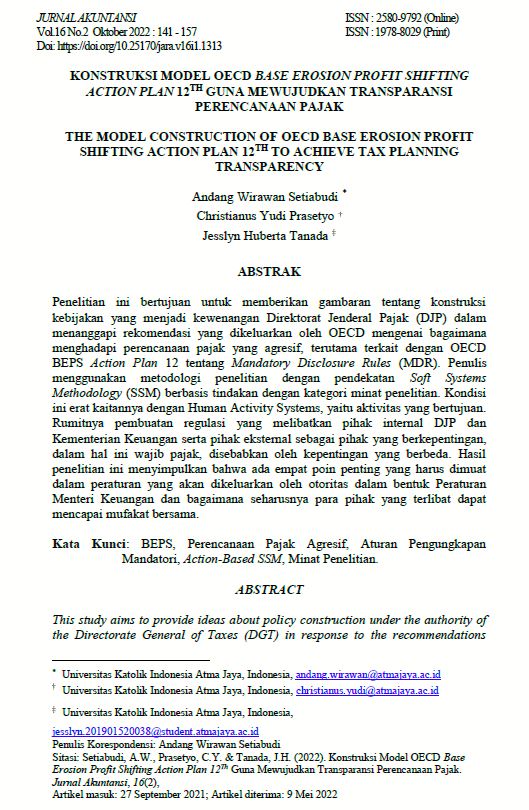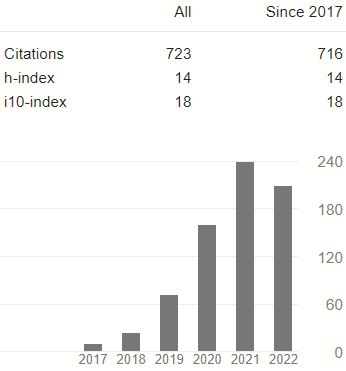KONSTRUKSI MODEL OECD BASE EROSION PROFIT SHIFTING ACTION PLAN 12TH GUNA MEWUJUDKAN TRANSPARANSI PERENCANAAN PAJAK
DOI:
https://doi.org/10.25170/jak.v16i2.2875Keywords:
BEPS, Aggressive Tax Planning, Mandatory Disclosure Rules, Action-Based SSM, Research InterestAbstract
This study presents ideas about the construction of policies under the authority of the Directorate General of Taxes (DGT) in response to recommendations issued by the OECD regarding how to deal with aggressive tax planning related to the current era of globalization. The tax avoidance practice is known as the Base Erosion and Profit Shifting (BEPS) which is allegedly rampant by taxpayers (WP), especially for the Multi National Company (MNC). The impact of the BEPS practice is the loss of state revenues experienced by almost every country, especially developing countries. This is a major concern for developing countries because tax revenues are an important component of government revenues to encourage development. The OECD BEPS action plan issued at the G20 meeting in Moscow Russia in July 2013 had 15 action plans. In this case, the Indonesian Government has not implemented all the recommendations for the OECD BEPS action plan. One recommendation that has not been made is the OECD BEPS action plan 12 concerning Mandatory Disclosure Rules (MDR). MDR here is about the disclosure of the company's strategies regarding tax planning. This is necessary because there must be tax planning transparency carried out by WP. This condition is closely related to Human Activity Systems, which are purposeful activities. Therefore the writer studied it with an action-based Soft Systems Methodology (SSM) approach with the category of research interest.
Keywords: BEPS, aggressive tax planning, mandatory disclosure rules, action-based SSM, research interest
References
Checkland, P., & Scholes, J. (1990). Soft Systems Methodology in Action. Wiley.
Clausing, K. A. (2009). Multinational Firm Tax Avoidance and Tax Policy. National Tax Journal, 62(4), 703–725. https://doi.org/http://dx.doi.org/10.17310/ntj.2009.4.06
Cockfield, A. (2014). Beps, and Global Digital Taxation. Tax Notes International, 75(11), 933–940.
Cockfield, A. (2016). Introduction: The Last Battleground of Globalization. Globalization and Its Tax Discontents, January. https://doi.org/10.3138/9781442660021-002
Darussalam, & Tobing, G. C. (2014). Rencana Aksi Base Erosion Profit Shifting dan Dampaknya terhadap Peraturan Pajak di Indonesia (Issue 0714). http://www.oecd.org/forum/what-the-beps-are-we-talking-
De Graaf, A., De Haan, P., & De Wilde, M. (2014). Fundamental Change in Countries’ Corporate Tax Framework Needed to Properly Address BEPS. Intertax, 42(5), 3016–3315.
Di Tingkat ASEAN, Rasio Pajak Indonesia di bawah Laos. (2018). Worldbank. https://databoks.katadata.co.id/datapublish/2018/11/26/di-tingkat-asean-rasio-pajak-indonesia-di-bawah-laos
Kementerian Keuangan RI. (2021).
Laporan Keuangan Bagian Anggaran 015 tahun 2013-2020. Www.Kemenkeu.Go.Id. https://www.kemenkeu.go.id/informasi-publik/anggaran-dan-realisasi-keuangan-kemenkeu/laporan-keuangan-kementerian-keuangan/
McLure Jr, C. E. (2005). Will the OECD Initiative on Harmful Tax Competition Help Developing and Transition Countries? Bulletin for International Taxation, 59(3), 90–98.
Menkeu: 2.000 Perusahaan Modal Asing Tidak Bayar Pajak. (2016). Www.Antaranews.Com. https://www.antaranews.com/berita/551189/menkeu-2000-perusahaan-modal-asing-tidak-bayar-pajak
OECD. (2013). Action plan on base erosion and profit shifting. In Action Plan on Base Erosion and Profit Shifting (Vol. 9789264202). https://doi.org/10.1787/9789264202719-en
OECD. (2016). Mandatory Disclosure Rules, Action 12 - 2015 Final Report. In Mandatory Disclosure Rules, Action 12 - 2015 Final Report. https://doi.org/10.1787/9789264261600-ko
Triyanto, H. U., & Zulvina, S. (2017). ANALISIS PERUMUSAN KEBIJAKAN MANDATORY DISCLOSURE RULES SEBAGAI ALTERNATIF DALAM MENGATASI PRAKTIK PENGHINDARAN PAJAK DI INDONESIA. Jurnal Pajak Indonesia, 1(1), 1–10.

Downloads
Published
Issue
Section
License
Authors who publish with this journal agree to the following terms:
- Authors retain copyright and grant the journal right of first publication with the work simultaneously licensed under a Creative Commons Attribution-ShareAlike 4.0 International License that allows others to share the work with an acknowledgment of the work's authorship and initial publication in this journal.
- Authors are able to enter into separate, additional contractual arrangements for the non-exclusive distribution of the journal's published version of the work (e.g., post it to an institutional repository or publish it in a book), with an acknowledgment of its initial publication in this journal.
- Authors are permitted and encouraged to post their work online (e.g., in institutional repositories or on their website) prior to and during the submission process, as it can lead to productive exchanges, as well as earlier and greater citation of published work.














